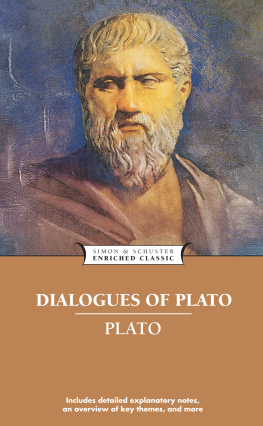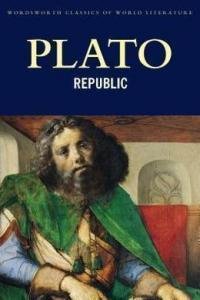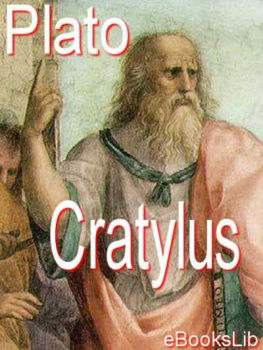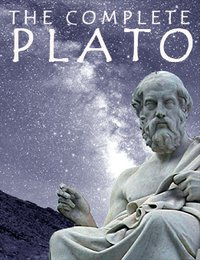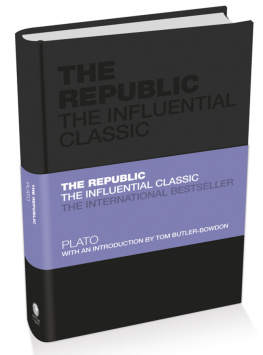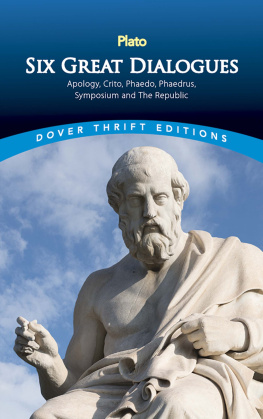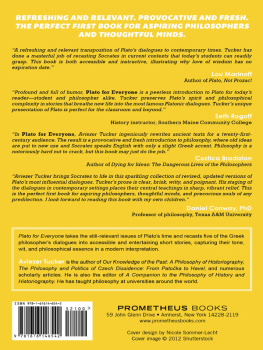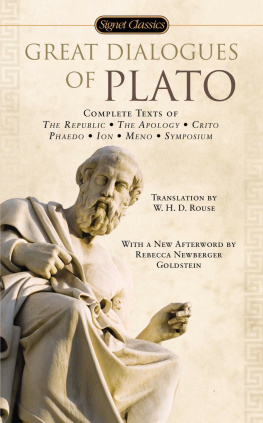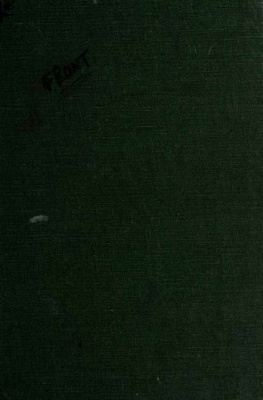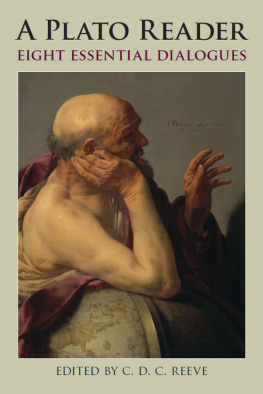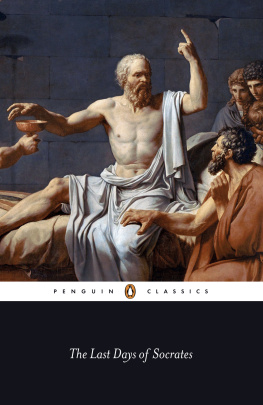Platon - Dialogues of Plato
Here you can read online Platon - Dialogues of Plato full text of the book (entire story) in english for free. Download pdf and epub, get meaning, cover and reviews about this ebook. City: Riverside, year: 2013, publisher: Simon & Schuster, genre: Art. Description of the work, (preface) as well as reviews are available. Best literature library LitArk.com created for fans of good reading and offers a wide selection of genres:
Romance novel
Science fiction
Adventure
Detective
Science
History
Home and family
Prose
Art
Politics
Computer
Non-fiction
Religion
Business
Children
Humor
Choose a favorite category and find really read worthwhile books. Enjoy immersion in the world of imagination, feel the emotions of the characters or learn something new for yourself, make an fascinating discovery.
Dialogues of Plato: summary, description and annotation
We offer to read an annotation, description, summary or preface (depends on what the author of the book "Dialogues of Plato" wrote himself). If you haven't found the necessary information about the book — write in the comments, we will try to find it.
Dialogues of Plato — read online for free the complete book (whole text) full work
Below is the text of the book, divided by pages. System saving the place of the last page read, allows you to conveniently read the book "Dialogues of Plato" online for free, without having to search again every time where you left off. Put a bookmark, and you can go to the page where you finished reading at any time.
Font size:
Interval:
Bookmark:
Thank you for downloading this Simon & Schuster eBook.
Join our mailing list and get updates on new releases, deals, bonus content and other great books from Simon & Schuster.
C LICK H ERE T O S IGN U P
or visit us online to sign up at
eBookNews.SimonandSchuster.com
We hope you enjoyed reading this Simon & Schuster eBook.
Join our mailing list and get updates on new releases, deals, bonus content and other great books from Simon & Schuster.
C LICK H ERE T O S IGN U P
or visit us online to sign up at
eBookNews.SimonandSchuster.com
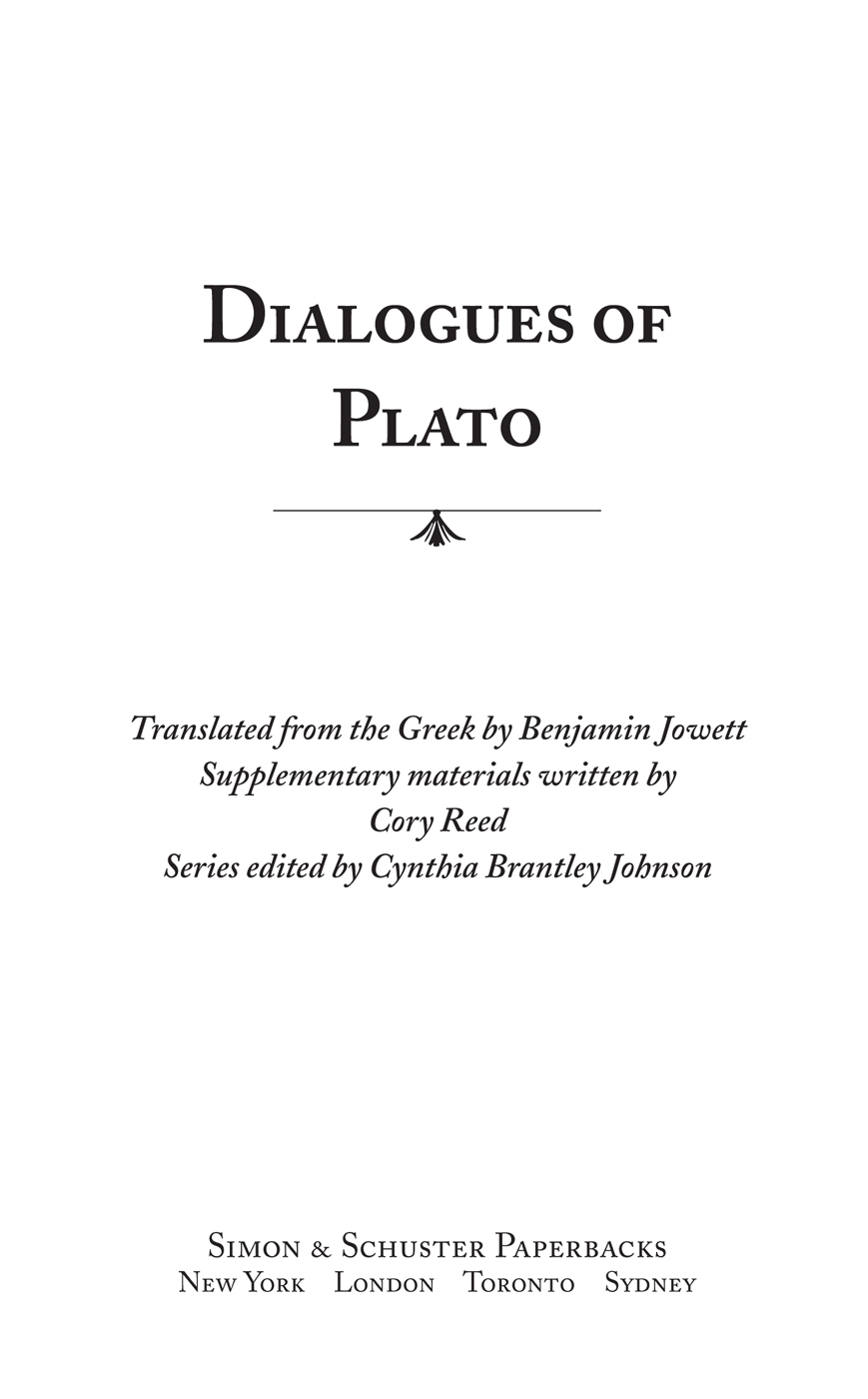

Simon & Schuster Paperbacks
A Division of Simon & Schuster, Inc.
1230 Avenue of the Americas
New York, NY 10020
www.SimonandSchuster.com
Copyright 1950, 2010 by Simon & Schuster, Inc.
Supplementary materials copyright 2001, 2010 by Simon & Schuster, Inc.
All rights reserved, including the right to reproduce this book or portions thereof in any form whatsoever. For information address Simon & Schuster Paperbacks Subsidiary Rights Department, 1230 Avenue of the Americas, New York, NY 10020
This Simon & Schuster paperback edition December 2010
SIMON & SCHUSTER PAPERBACKS and colophon are registered trademarks of Simon & Schuster, Inc.
The Simon & Schuster Speakers Bureau can bring authors to your live event. For more information or to book an event, contact the Simon & Schuster Speakers Bureau at 1-866-248-3049 or visit our website at www.simonspeakers.com.
Cover art by Robert Hunt
ISBN: 978-1-4391-6948-3
ISBN-13: 978-1-4516-8563-3 (eBook)



For more than two centuries, writers, philosophers, and statesmen throughout the world have celebrated Plato as one of historys greatest thinkers. In his dialogues (399360 BCE), Plato explores the great ideas of lifelove, death, search for immortalityand essentially what it means to be human. His dialogues are also full of biting social criticism. He rails at hypocrites, challenging politicians, teachers, and other leaders to rethink their morality and ethics. Unleashing the dramatic potential in the literary form of the dialogue, Plato creates lively debates among different points of view that invite the reader to join the discussion.
Though Platos dialogues are serious, they also provide entertaining discourse. They tell the story of his controversial teacher, Socrates (c. 469399 BCE), an independent thinker and nonconformist who is arrested on trumped-up charges of corruption and is tried, convicted, and executed by his political enemies. Meno and Euthyphro find Socrates at the height of his career, as he questions authority and decries hypocrisy. The trilogy of Apology, Crito, and Phaedo takes the reader from Socrates trial to his prison cell, for serious discussions on justice, loyalty, death, and the immortality of the soul. Symposium, one of Platos undisputed masterpieces, presents Socrates as a guest at a dinner party, joining his friends in food, drink, and a delightful night of speeches about love that are comic, sentimental, and inspirational. Set in ancient Athens during a period of political turmoil, Dialogues of Plato depicts Socrates as a vivid, imperfect human being, both funny and solemn, who challenges the leaders of Athenian society to think critically about their strongest convictions.
On a deeper level, Platos dialogues draw a distinction between the physical world that can deceive us and an ideal spirit world, which inspires us to strive for truth and goodness. Plato emphasizes a spiritual reward that awaits the faithful after a worldly life of trials and tribulations. Platos works not only influenced the foundations of Christianity, but also the development of philosophy from the time of his pupil Aristotle (384322 BCE) until the present day. With his focus on debate as a process for discovering the truth, Platos philosophy can be applied to a wide spectrum of ethical issues, including torture, war, and the role of government in a democratic society. Dialogues of Plato is among the first works of literature to ask the most pointed questions about human existence, questions that we continue to attempt to answer each day.
Very little is known about Platos life, and the sources that mention him are incomplete and unreliable. Even his date of birth is uncertain. He was born sometime around 427 BCE, the fourth child of an aristocratic Athenian family whose lineage claimed well-known ancestors like the Athenian lawgiver Solon, and even the god Poseidon. His family probably resided on the island of Aegina, about fifteen miles from Athens. Platos father died around the time of his birth, which later inspired the even more fantastic legend that the god Apollo himself was Platos real father. Platos stepfather was a close friend of the Athenian statesman Pericles, and the familys political connections may explain why the young Plato aspired to a career in public service.
Platos early education included training in gymnastics, the arts, mathematics, and history. Traditionally, male children of noble families were placed with older tutors who instructed them in virtue and practical matters. Although he may have had other teachers first, Plato met Socrates between the ages of fifteen and twenty. Plato entered adulthood during the last stages of the Peloponnesian War between Athens and Sparta, and it is possible that he served in the military. His brothers, Adeimantus and Glaucon, distinguished themselves in the war, and two of his uncles, Critias and Charmides, formed part of the elite Oligarchy of the Thirty, the antidemocratic government that ruled Athens after its defeat. Despite his familys involvement in Athenian politics, or perhaps because of it, Plato gave up his plan for a public career and instead became a dedicated pupil to Socrates, pursuing a life as a philosopher. Plato later cast his heroic brothers and controversial uncles as characters in a number of his dialogues.
Perhaps the most significant event that defined Platos adult life was the trial and execution of his mentor, Socrates, in 399 BCE. During the political instability that followed the Peloponnesian War, Athenian democracy collapsed (in 404 BCE), only to be restored a year later after a battle that claimed the lives of Platos uncles. A general amnesty was issued to stop acts of political revenge. Socrates, however, could not escape criticism for his previous associations with the enemies of the new government; when the amnesty prevented Athenian leaders from charging him with political crimes, they accused him of sacrilege against the gods and corrupting the youth of Athens. Plato attended the trial, which he recounts in Apology . He dramatizes Socrates last days awaiting execution in Crito and Phaedo .
In the years after Socrates death, Plato began writing his early dialogues, including Meno, Euthyphro, Apology, and Crito, featuring his teacher as the protagonist. The dialogue form allowed him to dramatize Socrates method, called dialectic, in which he used a series of questions to challenge his interlocutors preconceived assumptions and illogical reasoning. Like many of Socrates followers, he moved away from Athens, settling for a time in Megara, near the border with Sparta. Even as his fame as a philosopher spread, he was never far removed from political intrigue. He was invited several times to Sicily to tutor kings Dionysius I and II of Syracuse, where he established a close friendship with the elder kings brother-in-law, Dion. His experience as a royal tutor was a mixed blessing. In 384 BCE, Dionysius I grew angry with Plato and sold him into slavery. He was freed shortly thereafter and returned to Athens. Some twenty years later, Dionysius II accused his uncle, Dion, of plotting with Plato against him. Dion was banished to Athens and Plato was held under house arrest before being allowed to join the exiled Dion. A few years later, Dion would successfully overthrow his nephew only to be assassinated in 354 BCE.
Next pageFont size:
Interval:
Bookmark:
Similar books «Dialogues of Plato»
Look at similar books to Dialogues of Plato. We have selected literature similar in name and meaning in the hope of providing readers with more options to find new, interesting, not yet read works.
Discussion, reviews of the book Dialogues of Plato and just readers' own opinions. Leave your comments, write what you think about the work, its meaning or the main characters. Specify what exactly you liked and what you didn't like, and why you think so.

